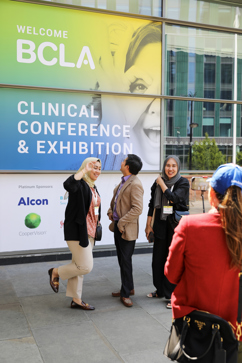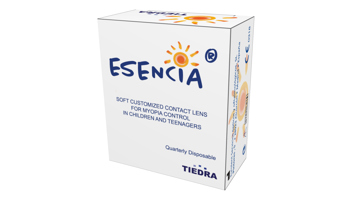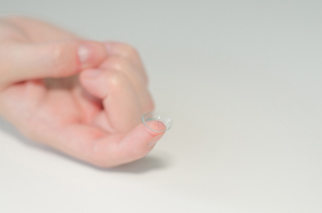
The British Contact Lens Association (BCLA) Conference and Exhibition was held in-person for the first time since 2019 at Manchester Central on June 9-11. Having previously reported extensively on the conference side of the event (Optician, 07.07.2023), here is a selection of highlights from the exhibition.
Alcon
To Alcon, the BCLA exhibition was an opportunity to listen to practitioners and consider how the company can position itself as the best partner possible.
‘We know that eye care professionals have a really tough job to maintain their patients’ loyalty,’ said Cheryl Donnelly, international head of professional education at Alcon. ‘We want to place Alcon as the go-to partner for practices. The fundamental thing is that we have the right innovative products and, with our water surface technology, practitioners have a choice.
‘Ten years ago, it was a choice between hydrogel and silicone hydrogel, now you have a choice between silicone hydrogel and water technology. With this innovation, we can have a true partnership with practices.’
Sophie Dutilloy, president of international vision care at Alcon, made the point that the latest contact lenses offer amazing benefits to patients but many people are still wearing very old technologies.
‘There’s a high degree of inertia in contact lenses, where, if people don’t complain, they are kept in the same lenses,’ said Dutilloy. ‘There’s still a lot of people wearing old HEMA [Hydroxyethyl methacrylate] material daily disposables, particularly in the UK, because there’s a feeling that, if you wear daily disposables, you don’t really need a more breathable lens. This is something that could be discussed and challenged by practitioners asking patients questions and explaining new options.’
Max Wolf, vice president and general manager for global vision care and contact lenses at Alcon, explained how observing trends within the contact lens market enabled the company to identify opportunities for innovation.
‘We are finally seeing good growth in the specialty lens segments, meaning lenses for astigmatism and lenses for presbyopia,’ said Wolf. ‘These segments are growing much faster than the market overall and this is because there are now good solutions on offer. In the short to mid-term, I expect this to continue.
‘The expansion of the daily disposable market against the reusable market means roughly a third of wearers across the globe are in daily disposables, and being a premium segment, this represents two-thirds of total value.
‘Over the past ten years, manufacturers have been focusing innovation on dailies but almost 65% of the wearers worldwide are in reusable lenses. That represented an opportunity for us and is why we introduced the (monthly) Total30 lens. There is significant opportunity to improve comfort over the longer wearing period and especially for patients with astigmatism,’ he added.
Wolf shared that the Total30 lens for astigmatism is being launched in Europe during the coming months, joining the sphere version, and there are plans in the short-term to round-out the product category with a version for presbyopia and combinations of toric and multifocal lenses.
Further along the timeline, Wolf said that Alcon will introduce a one-week modality lens named Precision7. 
‘This is another opportunity that we have identified,’ explained Wolf. ‘If you ask an ECP, they will say they would put every patient into a daily disposable silicone hydrogel lens if it were possible, due to the benefits of having a fresh lens every day in an healthy material. This isn’t possible for financial reasons, hence its only 35% of market. So, we are working on what we think is the next best thing.
‘Precision7 is a one-week lens that allows wearers to get closer to the daily wearing modality with a highly breathable lens at a price that they can afford.’
Johnson & Johnson
‘We are delighted to be back at the BCLA’, said Mathilde Beau, managing director of Vision Care Western Europe at Johnson & Johnson. ‘The main focus for us is around our latest innovation, which is Acuvue Oasys Max 1-Day in sphere and toric. Our stand is organised to allow delegates to experience the lens and learn more about it. So, we have our experts on hand plus a slit lap and space to try the lens first hand.’
Beau also noted that the stand design and approach to the show was influenced by sustainability.
‘Sustainability is increasingly a trend among consumers, and people ask us about the sustainability of contact lenses,’ said Beau. ‘At Johnson and Johnson Vision Care, we have been working on this topic for many years and we are passionate about how we can improve and contribute. We recognise our responsibilities. The stand is paperless, but you can access all the information through digital screens.
‘We have three focuses on sustainability. The first of these is climate, how we can reduce our footprint. The latest news on that is that 100% of our Acuvue lenses are now made from 100% renewable energy.
‘Second, we looked at recycling and waste management across the entire product chain, from manufacturing right up to the store. The third focus is on natural resources and how we can most sustainably position ourselves with respect to them.’
Menicon
Menicon unveiled all-new branding that plays on the company’s Japanese heritage for its made-to-order contact lens range at the BCLA. The various product categories are represented by elegant representations of relevant origami animals.
For example, orthokeratology, which involves the wearing of contact lenses at night, is illustrated by an owl, a bird species famous for being nocturnal. Other matchups include rigid gas permeable lenses with a hard-shelled turtle, and a water bird with soft contact lenses.
![]()
‘This rebrand reflects 70 years of innovation from Menicon,’ said Kevin Mitchell, managing director at Menicon UK. ‘Origami is a traditional artform using one sheet of paper folded intricately to create infinite possibilities and shapes. This concept both embraces our heritage and is aligned to our never-ending pursuit of creating the best lens. Like a master of origami, we too use precision craftsmanship to allow people to see life in detail.’
Elsewhere on its stand, Menicon was promoting its Bloom myopia management system, which is headlined by Menicon Bloom Night, an orthokeratology contact lens, and Menicon Bloom Day, a soft daily disposable contact lens with extended depth of focus technology. The contact lenses are supported with lens care solutions, fitting software, and the Menicon Bloom app.
‘It’s a star product for us, having won the Contact Lens Award at the Optician Awards in November,’ said Mitchell. ‘It takes time to establish a new product. There’s a lot of hard work that goes on behind the scenes training people to fit the products for myopia control and we are very pleased with how that’s going. Practice training is so important for us.
‘Myopia control is a journey for the patient and eye care professionals (ECPs) need to spend a lot of time developing their skills. My team are on the road all the time training and setting things up to ensure each practice that introduces Bloom feels confident with its deployment.’
Coopervision
CooperVision’s stated goal at the BCLA was to work to improve lives one person at a time, with three specific focuses to achieve this.
‘That concept is really about asking how we can make a difference in everything we do across our products and service offerings,’ said Heath Clash, head of communications for EMEA at CooperVision.
‘There are three things that we want to focus on. The first one is improving lives through providing more options for more patients through our extensive product range. We can meet 99.96% of all prescriptions with products in our range that, together, offer 900,000 parameter combinations.
‘We want to showcase that and encourage practitioners to come and talk to us about any need they have, from complex to mainstream.’
The second focus was on innovation and research within myopia management, centred mainly around the MiSight 1 day soft contact lens but also including the company’s orthokeratology stable of products.
‘We are seeing more or less equal efficacy these days across all these interventions that are available, and I think that is really fantastic for practitioners,’ said Krupa Patel, senior manager for professional services and myopia management for EMEA at CooperVision.
‘We aren’t arguing over percentages anymore and it is all about matching the right product to the right patient and their lifestyle, which is really the focus of our communication training and everything else we are doing.’
Clash noted the final focus was on improving lives through breakthroughs in sustainability.
‘This includes innovations in design, sourcing and recycling,’ said Clash. ‘It also includes offsetting, which allows us to take meaningful action today to achieve plastic neutrality while we work on those innovations. All CooperVision 1 day products in UK and Ireland are plastic neutral through offsetting.’
Positive Impact 
While Positive Impact’s sales focus at the event was on its NaturalVue 1-Day Enhanced Multifocal contact lens, the company also previewed two new contact lenses slated for launch this summer.
The first, Alexa AR, is an orthokeratology lens, available in sphere and toric, that offers high myopia compensation up to -10.00D.
The second, Esencia, is a customised peripheral soft contact lens available in sphere and toric, indicated for the correction and control of myopia progression.
‘Both these new products fit within our myopia management category,’ said Nick Atkins, managing director at Positive Impact.
‘Esencia is a really interesting lens with a patented design. It is a three-month replacement lens that has a toric form so it will be a really good solution for practitioners looking for toric soft options for myopic kids. Previously, if they had an astigmatism, they may have had to suffer slightly compromised vision or not be fitted for myopia control in this way.’
‘I think daily lenses have a place, obviously, but it is a relatively expensive option. So, a soft lens that is replaced four times a year is a much more economical option for children with parents that can’t afford to put their kids into daily disposables. It is cheaper than a monthly as well,’ he added.
Bausch + Lomb
B+L was founded in 1853, so this year marks 170 years of trading for the eye health company.
‘The key thing for us at the BCLA is to demonstrate the history of Bausch + Lomb as a company and show that, even after 170 years, the company is still innovating,’ said Richard Smith, head of professional services EMEA and Canada at B+L.
‘We are focused on driving technology forward in a way that will be best for our patients. 50 years after the launch of the first soft lens, we still have patients dropping out of contact lenses and we have to look at what, beyond the contact lens material, is causing that.
‘With the Ultra One Day disposable silicone hydrogel contact lens, we’ve gone beyond looking at just the contact lens material, but also at what is delivered from that contact lens to enhance the patient’s comfort as well.’
The company was also promoting its newly launched new parameters for the Ultra Multifocal for Astigmatism lens.
‘We have increased the range of product with over eight times more parameters,’ said Smith. ‘So, practices have a multifocal toric contact lens that is available in stock. From a UK perspective, you can order it and it will be with you within three or four days, allowing practices to meet the needs of the presbyopic astigmat. We’ve achieved this by continuing to look at our supply chain and how we can continue to improve our distribution.’
Safilens
With a large stand within the BCLA exhibition, Safilens was keen to raise awareness of its Delivery Tyro contact lens as a novel method of myopia control.
‘The big difference between this product and the other myopia management products in the marketplace is how Delivery Tyro works,’ said Ian McDermott, country manager UK at Safilens.
‘Most other products are based on a multifocal lens design. However, this is a single vision spherical daily disposable lens and the way it works is through the release of tyrosine into the eye. Tyrosine is an amino acid that is one of very few amino acids that is capable of breaking the blood barrier. It gets through the blood barrier and raises the level of dopamine in the eye. Higher levels of dopamine are proven to control the growth of the axial length.’
McDermott said that the product has been undergoing trials, mostly in Italy and Germany, for two years now and a clinical trial has been underway for several months.
‘We’ve been running the clinical trial since the end of 2022, and it is the clinical trial that will ultimately lead to the peer reviewed paper that we are waiting for. There are mixed views in the field as to whether the peer review is crucial.
‘I have a significant number of practitioners that have taken the product on because they want to try it out anyway. The results have been impressive, and we are confident that the results that the independent review body will achieve will be similarly impressive,’ he added.
NuVision 
Ocular biotherapies company NuVision used the BCLA to potentially orientate its star product for the optometry market, having previously been focused solely on the ophthalmology sector.
‘We make something called Omnigen, which is an amniotic membrane that aids the natural healing process in ophthalmic conditions,’ said Tonicha Spencer, head of UK sales and clinical support at NuVision.
‘It’s the sac that holds the baby in the womb. We take that from voluntary consenting donors and then manufacture it into a dry material. To allow Omnigen to be used in outpatient settings, we have invented Omnilenz, which is a special bandage contact lens that has a ridge around the outside. You put the Omnigen into the lens and then you can put it onto the eye as you would with a normal bandage contact lens.’
Spencer said the product could be used in optometry settings for conditions including recurrent corneal erosion and dry eye disease.
‘The skill set required to apply the product is not difficult at all and we have just finished a clinical trial by the team at Aston University in dry eye disease,’ said Spencer. ‘We got a 71% reduction in symptoms in six months and that shows some of the potential of this product.’
 Ophtecs
Ophtecs
Japanese company Ophtecs has been manufacturing contact lens solutions and eye drops for 25 years and was at the BCLA to introduce its products to the UK market.
The company showcased its Cleardea contact lens solutions brand, which had three variations of cleaning solutions for various lens types and a multipurpose solution for soft lenses.
‘We’ve sold our products across Asian-Pacific for many years and, in 2022, we have begun to sell our product in Europe,’ said Han Chih Chang, marketing executive at Ophtecs.
‘We have two unique ingredients. The products use povidone iodine as a disinfectant, which is known to be highly effective against the microorganisms that adhere to contact lenses. Also, we use a proteolytic enzyme to break down and remove protein deposits effectively without the need for a separate cleaner. Also present is a surfactant to remove lipid deposits.’
Topcon
‘The BCLA is a very popular show for us’, said Fergal Byron, senior technical product manager at Topcon Healthcare Europe. ‘We help with instruments for workshop sessions and have an extensive array of instruments on our stand to show people.’
With dry eye always a big talking point at the BCLA, Byron drew particular attention to the Eye-Light device.
‘We are the UK and Ireland distributor of the Eye-Light device, which is made by Italian company Espansione,’ said Byron. ‘Eye-Light uses a combination of therapies; both Intense Pulsed Light (IPL) and Low Level Light (LLLT) therapy, the latter of which involves a mask. Most devices on the market are IPL only so you are treating a patient with high-heat intensity for a very short pulse duration but this basically only treats the lower lid.
‘With the Eye-Light’s mask you can treat both lids’ meiboimian glands with LLLT. When you wear the mask, it keeps your eyes closed. We treat initially with IPL on the lower orbital, then 15 mins with the face mask,’ he added.
